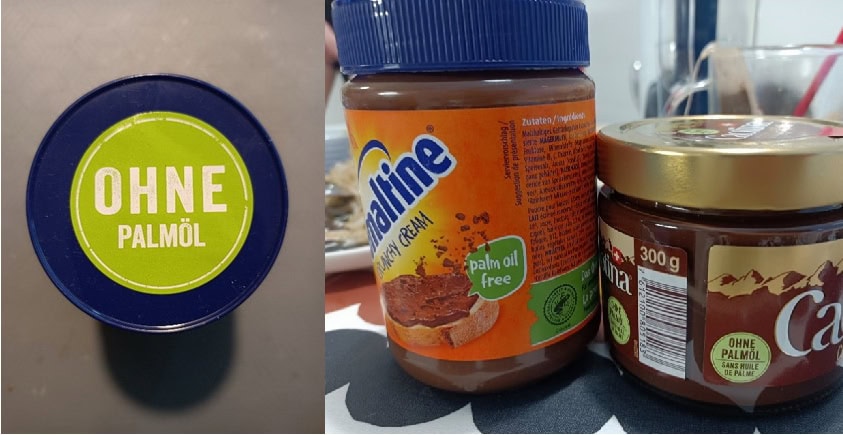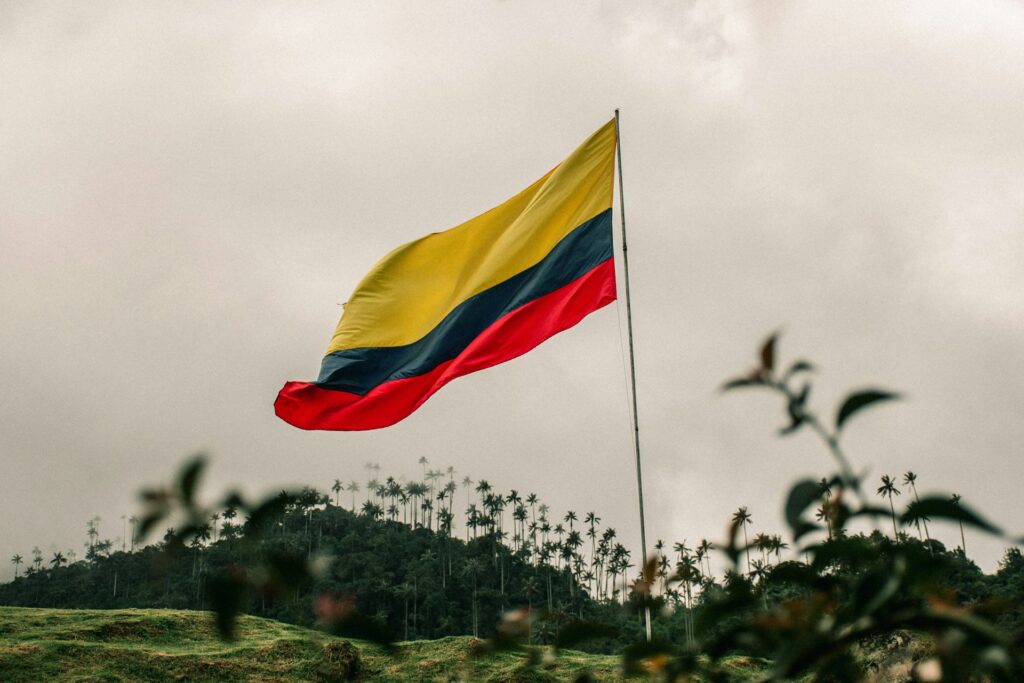The issue of palm oil is one of the strained cases between Indonesia and European Union. For Indonesia, EU Deforestation Regulation (EUDR) emphasizes the EU’s “moral finger-wagging” while for the EU, the trade policy must be green and ensure sustainability.
Palm oil plays a significant role in the Indonesian economy. In early 2024, a controversial issue about oil palm occurred again in Indonesia. One of the chocolate producers inserted “palm oil free” label in their container, and became a target of protest by a religious farmer group Santri Tani. The protesters claimed, that labeling distributed food products palm oil free, the producer would commit state treason.
In Indonesia, food product labeled with ‘palm oil free’ is unacceptable. When such labels are found, the Ministry of Trade can ask for the products to be withdrawn from the market. The label violates the regulation of the National Agency of Drug and Food Control of Indonesia no. 20/2021 on Processed Food Label (article 67 point 2, l) which states “business actors are prohibited from including statements or information that directly or indirectly denigrate the goods and/or services of other parties.”
The article does not name specific products, and there has been only two cases affected by this regulation so far, with both products, asserting the “palm oil free” labels.
Palm oil is a complex economic issue. Indonesia and Europe have their own perspectives, mainly based on different conceptions of sustainability. Europe wants to regulate palm oil so that the EU citizens would not consume products that contribute to deforestation or forest degradation worldwide, through the EU Deforestation-Free Regulation (EUDR). Thus, it is for environmental sustainability. Meanwhile, Indonesia, the world’s biggest producer and exporter of palm oil (60%), claims the EU regulation on palm oil will impact the global food market, even food security in the future.
Palm oil is a complex economic issue. Indonesia and Europe have their own perspectives, mainly based on different conceptions of sustainability.
There are 16 million hectares of oil palm plantations in Indonesia, and 41% of these or around 7 million hectares belong to 8 million small farmers, and trade disruption would put their lives at risk. For the Indonesian authorities, palm oil is an economic opportunity, thus sustainability is about fairness, poverty eradication, and society. Such different conceptions of sustainability regarding palm oil remain in discussions between the EU and Indonesia (also Malaysia).
Indonesia had banned palm oil exports in 2022 due to the high domestic price of vegetable oil and this shocked many countries, including the farmers in Indonesia. The ban only lasted for two months, yet this shifted the paradigm of the oil palm industry in global food (and energy) security clarifying that Indonesia did not want to be dictated, especially when there was shortage of vegetable oil (sunflower oil) in Europe because of Russia-Ukraine war.
EUDR and EU perspective
In 2023, the regulation on deforestation-free products, known as EUDR, came into force. Large companies had 18 months to prepare (with an additional 6 months for small enterprises). EUDR is designed to regulate products consumed by the EU citizens so as not to contribute to deforestation, greenhouse gas emissions, and biodiversity loss.
EU enacted the regulation that commodities representing the largest share of deforestation, such as palm oil (33.95%), soy (32.83%), wood (8.62%), cocoa (7.54%), coffee (7.01%) and beef (5.01%) must certify their products for having deforestation-free land. Specifically for palm oil, the certification must come from the Roundtable on Sustainable Palm Oil (RSPO).
Through EUDR, EU aspires to a global environmental leadership role in addressing ecological and social concerns associated with trade-driven tropical deforestation and forest degradation. However call for a revision of this regulation came also from the EU members and their local farmers because the administrative tasks, such as “due diligence, traceability, and certification”, would burden farmers. The same requirement would definitely burden smallholders, indigenous peoples, and local communities in producer countries outside the EU.
Through EUDR, EU aspires to a global environmental leadership role in addressing ecological and social concerns associated with trade-driven tropical deforestation and forest degradation.
In the EU, products containing the label ‘palm oil free’ are common. When this label is attached to the product, it suggests the product would be ‘sustainable, environment-friendly and respect labour’. Consequently, without the label, palm oil in a product indicates something is wrong with palm oil – although the discussion between good and bad palm oil is still controversial and debatable, depending on perspectives.
Yet such a label actually only raises awareness, it is up to the consumers whether they want to buy the products or not. Therefore, while the label is acceptable in Europe, it is not in Indonesia. As the story in the beginning of this article showed, the label can trigger chaos and lead to the banning of certain products.
Palm oil is used in many daily-life products, like chocolate, biscuits, bread, cosmetics, cooking oil and furniture. Moreover, the palm oil crop is cheap and efficient, with “one hectare of well-managed plantation estate land can produce up to 10 times more oil than other oilseed alternatives”.
Attacks and counters towards palm oil
Apart from ‘palm oil free’ label that is common in Europe, negative campaigns attacking palm oil products continue in Europe. Palm oil is considered the most controversial option for cooking oil in terms of health and environmental reasons. According to reports palm oil contains high-saturated fats but there are also many health benefits: it prevents vitamin D deficiency in many middle-income countries and protects cognitive and cardio health. Combined with the allegations of deforestation of the rainforest and risking the loss of endangered species, many producers then marked their products with the “palm-oil free” label.
Apart from having a dialogue with the policymakers in the EU on environment protection, Indonesia also tried to counter, or limit the general negative campaigning against palm oil related to health and environmental issues. Indonesia published a book The Myths and Facts of Indonesia’s Palm Oil Industry (the latest edition was in 2023) prepared by the Palm Oil Agribusiness Strategic Policy Institute.
Palm oil is considered the most controversial option for cooking oil in terms of health and environmental reasons.
The content countered the argument of climate impacts – such as biodiversity loss and deforestation – on health, and social impacts – such as corruption, land-grabbing, and forced or child labor. The book is used by the Indonesian Ministry of Foreign Affairs through its embassies to tackle negative campaigns against oil palm, notably in Europe. This book is available only in English, used mainly by diplomats and clearly intended for international readers. According to our interviewed source, not many academics nor community organizations in Indonesia knew about its existence.
Another counter effort was to advertise public services the palm oil company provides for the remote areas, such as providing public transports, schools, health centers and daycare facilities.
Perspectives from Indonesia
Although EUDR also affects coffee and cocoa, Indonesia thinks that the EU’s regulation is “moral finger-wagging” specifically for its palm oil products. According to Indonesian resources (around 30 stakeholders being interviewed from government, media, non-government organizations both local and international agencies, associations, and academicians), the EU’s pressure started in 2016 with the RED II policy or Renewable Energy Directive 2018. Later, with the EUDR, Indonesia assumed that the EU tried to protect its local farmers cultivating soybean, rapeseed, flowers, and olive oil from the import of palm oil, and called it protectionism.
Interviews revealed that EUDR has become another tool to regulate palm oil due to its potential in biodiesel production, which is important for sustainable energy transition while maintaining energy security. Dialogues and negotiations between the EU and Indonesia (and Malaysia) have been ongoing through diplomacy and Joint Task Force on EUDR since May 2023. Planning to work closely on efforts on deforestation in the third meeting in October 2024, EU Commission proposed to postpone the EUDR application by one year to the end of 2025.
As our research on good and bad palm oil started, we came to Indonesia during summer of 2024 and heard the perspectives of many stakeholders. We met people from different institutions: government, companies, NGO’s, media, associations including certification-organization like RSPO (Roundtable on Sustainable Palm Oil) and ISPO (Indonesian Sustainable Palm Oil), academicians, and even international agencies whose work is related to palm oil.
These stakeholders in the palm oil industry interact with various others, for example, one agency represents many interests, such as farmers and members of the association or a government worker, but also owning a small oil palm plantation. Thus each stakeholder has different interests regarding the commodity’s impacts.
Palm oil industry in Indonesia has been organized by at least 30 ministries, including local government institutions, with different aspects and scopes to regulate.
Their narratives show different power dynamics and negotiations to pursue their interests. Yet, government policies, their implementation, and supervision remain weak in areas of “deforestation, biodiversity loss, forest fires and air pollution, carbon emissions, water abstraction, including in land conflicts and Indigenous rights” –issues that are environmentally important. When it comes to sustainability, palm oil is a complex issue hindered by problems of forest opening, land certification, greedy companies, and corrupted elites. The players are also numerous and diverse from the national to the local levels.
Palm oil industry in Indonesia has been organized by at least 30 ministries, including local government institutions, with different aspects and scopes to regulate. The obvious ones would be the Ministry of Environment and Forestry with the Ministry of Agriculture. The interviews also revealed that even the Ministry of Religion was involved in handling this issue. This is a portrayal of palm oil industry magnitude in Indonesia, also for those not directly relevant to palm oil.
Yet all these stakeholders, including critical NGOs, have acknowledged the importance of palm oil for Indonesia. They just hoped the government would regulate fairly without being reckless in managing palm oil. Therefore, instead of acting as “moral finger-wagger”, it is expected that the EU could help an exporter country like Indonesia to pursue palm oil sustainability, both economically and environmentally, especially for the wider public impacted directly by palm oil.
Through the lens of sustainability
Both EU and Indonesia use the term ‘sustainability’ to defend their standpoint. This means ‘environmental sustainability’ for the EU and ‘economic sustainability’ for Indonesia (and Malaysia). Thus from the standpoint of the latter, EU regulations were always seen as discriminatory. A study in Bulletin of Indonesia Economic Studies back in 2022 stated that “both the EU and Indonesia are concerned about sustainability; however, [yet] have different perspectives and parameters to ensure environmental standards are upheld”.
EU has claimed the expansion of palm oil plantations in Indonesia has resulted in deforestation and peatland degradation. Yet, most interviewees from the government side worried that when upholding environmental issues, “people cannot afford to eat”.
The Indonesian case for sustainability still revolves around reducing poverty, leaving no one behind, and protecting smallholders, even when opening two percent of the abundant forests in Papua land for palm oil plantation. In line with the NGOs wishes, when opening palm oil plantations in Papua, the government must be able to tackle food insecurity in Papua, as well as malnutrition due to food imported from outside the region.
With different views on labeling, managing sustainability and certification, it is obvious that governing palm oil is not easy. The exporting countries, such as Indonesia, and the recipient and regulator institution, such as the EU, need to sit down together to negotiate agreeable solutions.
Indonesia is also determined to have its own sustainable palm oil certification, compared to RSPO. The Indonesian Sustainability Palm Oil (ISPO) was established by the Ministry of Agriculture in 2015 and it later expanded through the Presidential Regulation in 2020. However, the ISPO regulation was likely imposed more for upholding national sovereignty against the RSPO.
ISPO developed by Indonesia, is – despite its compulsory nature – limited with authority and enforcement when working for sustainable palm oil, in tackling “deforestation, biodiversity loss, greenhouse gas emissions, and social conflicts between big plantations and local communities”. It required many submitted documents and it emphasized sanctions over prevention, and guidance and sustainability actions for farmers and companies. The global market, including EU, has not acknowledged ISPO’s sustainability standards yet.
With different views on labeling, managing sustainability and certification, it is obvious that governing palm oil is not easy. The exporting countries, such as Indonesia, and the recipient and regulator institution, such as the EU, need to sit down together to negotiate agreeable solutions. Although the commitment to protecting the environment and tackling the climate crisis are important, the EUDR should be proportioned to address the multilateral agreement from the principle of common but differentiated responsibilities as the UN Climate Change Convention recommended.
Responsibility towards the environment (and tackling climate crisis) is different between low and middle-income countries such as Indonesia and high-income countries such as in the EU. Palm oil has a potential for energy security in the future, and both the EU and Indonesia must work together to achieve sustainability aspects of palm oil, both environmentally and economically.
Ratih D. Adiputri is a postdoc researcher at the Department Social Sciences and Philosophy, University of Jyväskylä, working on the project Good and bad palm oil funded by the Kone Foundation (no. 202205436).
Article image: Ratih Adiputri




